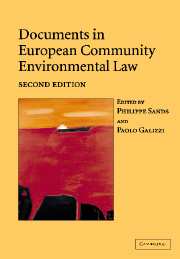Book contents
- Frontmatter
- Contents
- Preface
- PART I General principles of EC environmental law
- PART II European Community institutions and legislation
- 6 EC Treaty, as amended by the 1986 Single European Act, the 1992 Treaty on European Union, the 1997 Treaty of Amsterdam, the 2001 Treaty of Nice and the 2003 Act of Accession (selected articles)
- 7 Council Regulation (EEC) No 1210/90 of 7 May 1990 on the establishment of the European Environment Agency and the European environment information and observation network (OJ L 120 11.05.1990 p. 1)
- 7A Decision of 21 March 1997 on public access to European Environment Agency documents (OJ C 282 18.09.1997 p. 5)
- 8 Council Resolution of 7 October 1997 on the drafting, implementation and enforcement of Community environmental law (OJ C 321 22.10.1997 p. 1)
- PART III The relationship between environmental protection, financial assistance and free trade
- PART IV Procedural techniques of environmental protection
- PART V Protection of air quality
- PART VI Biodiversity and nature conservation
- PART VII Waste
- PART VIII Dangerous substances
- PART IX Water quality
6 - EC Treaty, as amended by the 1986 Single European Act, the 1992 Treaty on European Union, the 1997 Treaty of Amsterdam, the 2001 Treaty of Nice and the 2003 Act of Accession (selected articles)
from PART II - European Community institutions and legislation
Published online by Cambridge University Press: 06 January 2010
- Frontmatter
- Contents
- Preface
- PART I General principles of EC environmental law
- PART II European Community institutions and legislation
- 6 EC Treaty, as amended by the 1986 Single European Act, the 1992 Treaty on European Union, the 1997 Treaty of Amsterdam, the 2001 Treaty of Nice and the 2003 Act of Accession (selected articles)
- 7 Council Regulation (EEC) No 1210/90 of 7 May 1990 on the establishment of the European Environment Agency and the European environment information and observation network (OJ L 120 11.05.1990 p. 1)
- 7A Decision of 21 March 1997 on public access to European Environment Agency documents (OJ C 282 18.09.1997 p. 5)
- 8 Council Resolution of 7 October 1997 on the drafting, implementation and enforcement of Community environmental law (OJ C 321 22.10.1997 p. 1)
- PART III The relationship between environmental protection, financial assistance and free trade
- PART IV Procedural techniques of environmental protection
- PART V Protection of air quality
- PART VI Biodiversity and nature conservation
- PART VII Waste
- PART VIII Dangerous substances
- PART IX Water quality
Summary
Editorial note
The main EC institutions with responsibilities for development of EC environmental law under the EC Treaty (as amended by the 1986 Single European Act, the 1992 Treaty on European Union, the 1997 Treaty of Amsterdam and the 2001 Treaty of Nice) are the European Parliament (Articles 189–201); the Council (Articles 202–210); the Commission (Articles 211–219); and the European Court of Justice (to which is attached a Court of First Instance (Articles 220–245)). The Economic and Social Committee (Articles 257–262) and the Committee of the Regions (Articles 263–265) also play a role.
Secondary environmental legislation adopted by the Community comprises regulations, directives and decisions, which are binding, and non-binding recommendations and opinions (Article 249).
Source: OJ 24.12.2002 C 325/23
EC Treaty, as amended by the 1986 Single European Act, the 1992 Treaty on European Union, the 1997 Treaty of Amsterdam, the 2001 Treaty of Nice and the 2003 Act of Accession (selected articles)
Part five
Institutions of the Community
Title I
Provisions governing the institutions
Chapter 1
The institutions
Section 1
The European Parliament
Article 189
The European Parliament, which shall consist of representatives of the peoples of the States brought together in the Community, shall exercise the powers conferred upon it by this Treaty.
The number of Members of the European Parliament shall not exceed 732.
Article 190
The representatives in the European Parliament of the peoples of the States brought together in the Community shall be elected by direct universal suffrage.
[…]
- Type
- Chapter
- Information
- Documents in European Community Environmental Law , pp. 141 - 167Publisher: Cambridge University PressPrint publication year: 2006



